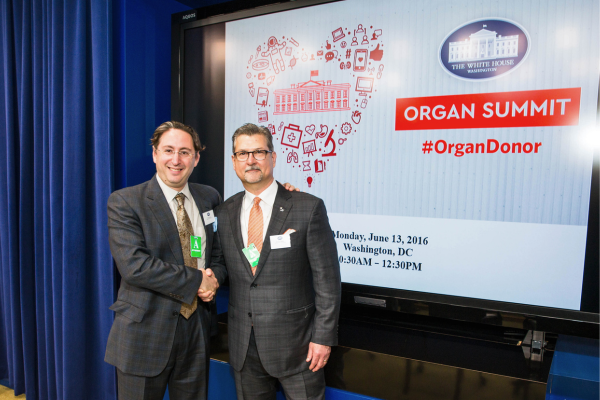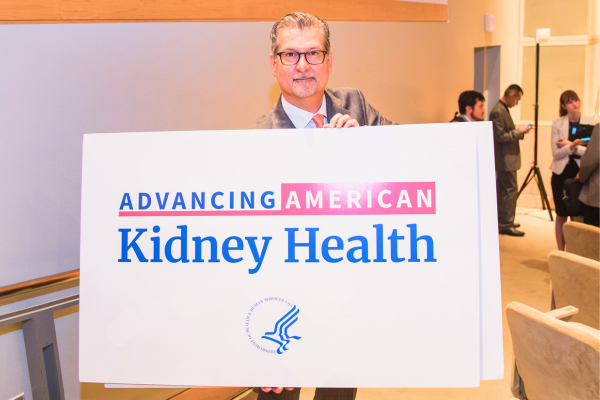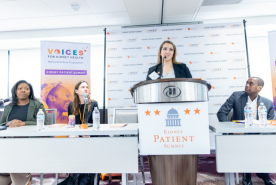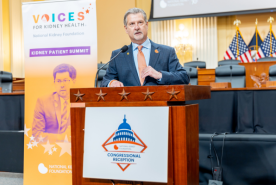Tests and procedures Prevention, daily life, and wellbeing Health systems, social systems, and environmental factors Government About NKF Fundraising and volunteering
September 16, 2025
Behind every milestone in kidney health is a story of patients, doctors, and advocates working together. Here’s how NKF helped lead the way from 2010 to 2020.
“How NKF Got Here" is a series highlighting NKF’s most significant achievements over the decades. Explore the full collection of articles here.
One in three adults in the U.S. is at risk for kidney disease. Over the last decade, National Kidney Foundation (NKF) has worked to make sure those people aren’t forgotten. From fighting for fairer testing to protecting transplant access, NKF has been a driving force for progress.
Kidney Care Milestones in the 2010s
- 2010: NKF joined the National Salt Reduction Initiative, along with more than 45 organizations and nationally recognized brands, to help people eat less sodium and get healthier. High blood pressure is a risk factor for kidney disease. This helped lower risk factors for both heart and kidney disease.
- 2011: NKF launched NKF PEERs, a mentoring program that connects patients with others who understand their kidney journey.
- 2013: The HIV Organ Policy Equity Act (HOPE Act) legalized the use of organs from an HIV-positive donor to an HIV-positive recipient.
- 2016: NKF opened the Professional Education Resource Center (PERC®), with new courses designed to help kidney healthcare teams learn about new treatments.
- 2016: NKF collaborated with the National Health Council to create rules that allow patients and care partners to give testimonies to the FDA about treatments for rare kidney diseases. Today, this program is called Voice of the Patient: Externally Led Patient-Focused Drug Development Meetings (VOP EL-PFDD).
- 2016: NKF CEO Kevin Longino and National Board Member and transplant surgeon Dr. Cooper participated in the White House Organ Summit to reduce the transplant waiting list and improve donor support.

- 2016: NKF introduced CKDintercept®, a program to help doctors find and treat CKD earlier in primary care.
- 2017: NKF created THE BIG ASK, THE BIG GIVE®, a free platform that teaches people how to ask their friends and loved ones to consider living organ donation.
- 2017: NKF held the first-ever Consensus Conference to Decrease Kidney Discards to develop recommendations that utilize more donated kidneys.
Help us unravel the silent threat and rewrite the future of kidney health.
This season of giving, you have the power to rewrite the odds for patients and families facing kidney disease. With your generosity, we’re able to:
- Equip patients and families with knowledge, resources, and access to high-quality care.
- Advocate for policies that address disparities and prioritize kidney health for all.
- Fund research and technology to advance early detection, improve treatment, and expand transplant access.
- 2017: NKF held the KDOQI Home Dialysis Conference to address barriers to home dialysis and increase its utilization.
- 2018: Tolvaptan, the first medicine to slow kidney growth and damage in people with autosomal dominant polycystic kidney disease (ADPKD), was approved.
- 2018: NKF led a joint workshop with the FDA and European Medicines Agency to review using albuminuria (protein in urine) as an early marker in CKD. This helped guide how new kidney drugs are studied and approved.
- 2018: NKF partnered with ASCP and the top labs to make CKD testing easier and more common. They introduced the “Kidney Profile,” two simple tests to detect kidney disease earlier.
- 2019: NKF joined forces with the U.S. Department of Health and Human Services (HHS), the American Society of Nephrology (ASN), and actor, activist, and entrepreneur Wilmer Valderrama to launch the “Are You the 33%?” Campaign, a national campaign to raise awareness that 1 in 3 adults is at risk for kidney disease.
- 2019: After years of NKF advocacy, the White House issued an Executive Order launching the Advancing American Kidney Health (AAKH) initiative. This plan focused on earlier detection of CKD, expanding living and deceased donation, supporting home dialysis, and encouraging new treatments.
- 2020: NKF worked with HHS to confirm that kidney transplants and access surgeries were “essential” and should not be delayed during the pandemic. This protected patients from dangerous delays in life-saving care.
- 2020: NKF and the American Society of Nephrology (ASN) formed a joint task force to replace race-based kidney function equations with a fairer, more accurate standard. This change to the eGFR equation helped reduce bias in diagnosis and improved equity in kidney care.
- 2020: NKF and the National Committee for Quality Assurance launched a new quality measure (under Kidney Health Evaluation for Patients with Diabetes/HEDIS) to ensure more adults with diabetes get tested for kidney disease. This expanded early detection, helping doctors find kidney problems sooner and slow disease progression.
- 2020: NKF advocates helped pass The Immuno Bill, providing lifetime Medicare coverage of anti-rejection medicines for kidney transplant patients, ending the old 36-month limit. Dr. Cooper was the sole witness invited to testify before the House Committee. This means more people can keep their transplanted kidneys healthy without worrying about losing coverage for critical medicines.


















